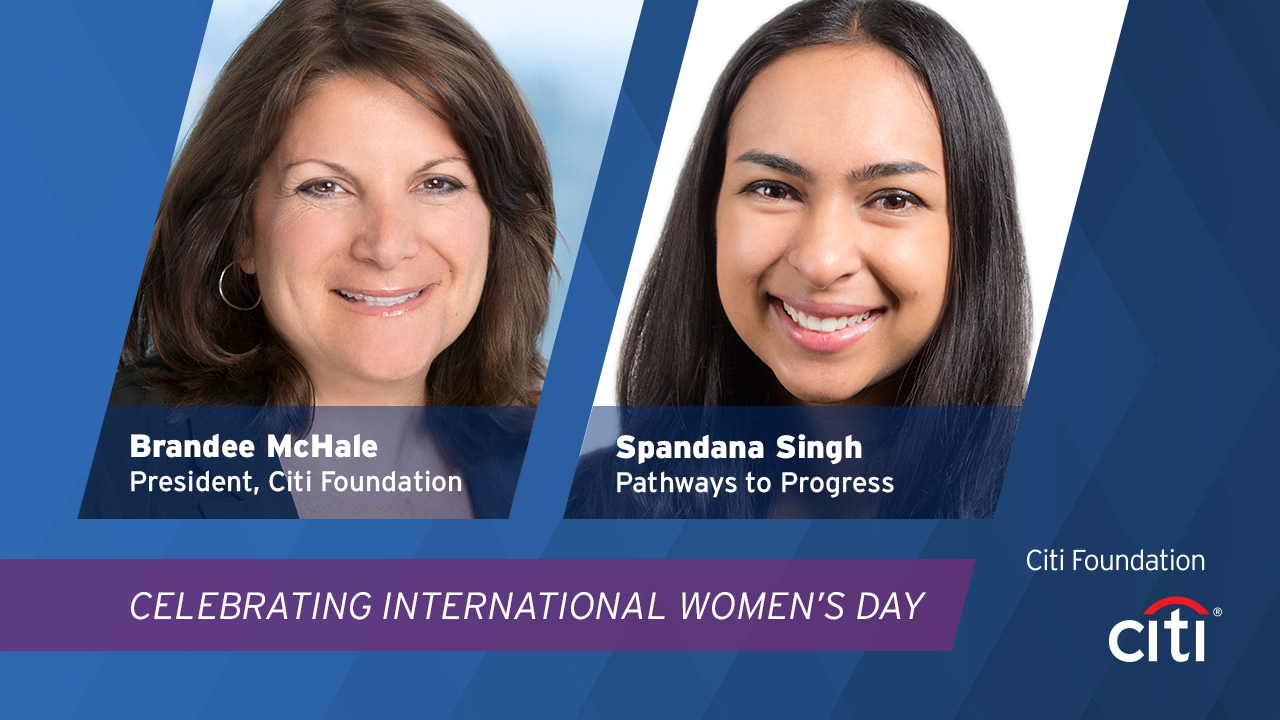On Opportunity, Success and International Women's Day
A Conversation Between Citi Foundation's Brandee McHale and Pathways to Progress Participant Spandana Singh
Blog Post

March 6, 2018
While I have always understood the mission of International Women’s Day (IWD) to celebrate the social, economic, cultural and political achievements of women, I didn’t actually engage until I came across #InternationalWomensDay. Each year, millions of people on social media post about what the day means to them and the women who have inspired them. Before social media, this particular movement felt out of reach for most people to get involved. But as people around the world posted their own stories, it gave the movement a face. Since then, numerous hashtags have gained substantial traction and have succeeded in raising awareness of issues often touched upon by International Women’s Day leaders while also engaging people across generations to share their experiences and propose solutions.
In anticipation of this year’s International Women’s Day, I had a chance to have a conversation, in real life or “IRL,” around breaking down barriers and creating opportunities for success and growth with Brandee McHale, president of the Citi Foundation and director of corporate citizenship at Citi. Brandee has worked for Citi and the Citi Foundation for over 20 years and was pivotal to launching the Pathways to Progress initiative, which supports youth empowerment and employment—including my current work at New America with the Millennial Public Policy Fellowship. Our conversation has been edited and condensed for clarity.
SPANDANA SINGH: As a young woman of color working and advancing in a field where women, and other marginalized groups have not historically been valued or had a seat at the table, gender parity is something I am particularly passionate about. Brandee, you have spent your career breaking down barriers and providing opportunities to people from underrepresented communities. With International Women’s Day happening on March 8th, I’m curious to hear your thoughts about how this day of celebration and action fits into our current cultural moment.
BRANDEE MCHALE: This has certainly been a moment of incredible awareness, change, and dialogue, led by and focused on women. I think that this particular International Women’s Day for me has even more importance than perhaps it has had in years past. During a time of so much hurt, a time when so much healing needs to be done, and when we have so many things to fight for and serious societal issues to confront, International Women’s Day does what I think we so desperately need to do right now. It gives all of us a moment to pause and celebrate how far we’ve come, while continuing to hold ourselves accountable for how far we still have to go.
The theme of this year’s International Women’s Day is “press for progress,” which really is a powerful way to continue to drive the mobilization and empowerment of women around the world. Contrary to popular belief, women are not a monolithic group. Women come from different cultures, places, and experiences, but this overarching theme of pressing for progress is something that unites all of us.
I completely agree that women are not a monolithic group. I think this is a point that is often overlooked. However, as you mentioned, mobilizing and connecting across differences can benefit all of us. With this goal in mind, what is one challenge that you believe is affecting women globally?
My colleagues and I at the Citi Foundation have focused our attention on the labor force gender gap. While labor force participation rates are at an all-time high, labor force parity and equity are not. Focusing on the labor force gender gap simply isn’t just the right thing to do; it makes smart, economic sense.When women are given an opportunity to realize their full economic and social potential, both men and women benefit. Research reveals that by increasing female participation rates in the labor force, the GDP of some countries could rise 12% over the next 15 years, and in some developing countries as high as 20%.

Citi Foundation president Brandee McHale recently sat down with Millennial Fellow Spandana Singh to discuss International Women's Day.
Your commitment to opening doors and creating opportunities for young people, especially those who’ve been historically forgotten about or excluded, directly impacts me and the nine other Millennial Public Policy Fellowship fellows. Does your commitment to inclusivity and opportunity come from a personal place?
The hardest thing for me when I first started working here as an intern, and even when I took on my most recent role, was to feel confident finding my own voice, especially in a room full of men where I may have been at times the only woman. Although no one ever said, “It’s not your place,” I would occasionally wait to be asked my opinion. When I realized that, I began to understand why all the men around me weren’t waiting to be asked their opinions. So I learned to get comfortable with jumping in and saying what I had to say, and in turn I became even more committed to creating those opportunities for young people and other women.
Progress has definitely been made to combat these norms in some places. But like you said before, women are not a monolith, and still so much work must be done. Having a support system can make creating lasting change easier. Have you had any role models or key supporters who lifted you up on your journey to becoming the director of a major foundation?
I’ve had many women who’ve been incredible role models, and I’ve also had some incredible sources of inspiration. Because I’ve had people who helped show me the way, I want to be that role model for people who follow me. I’m a working parent. I have three children and I’ve had all my kids while working at Citi. I’ve learned that as a woman, you can have it all; you just can’t necessarily have it all equally at the same time.
To learn more about the Citi Foundation’s efforts to empower young women through Pathways to Progress, read their latest report.
This blog is part of Caffeinated Commentary - a monthly series where the Millennial Fellows create interesting and engaging content around a theme. For March, the fellows have decided to create content around the concept of collaboration. They might be in conversation with interesting folks or choose to explore the ways in which different entities could collaborate for the greater social good.